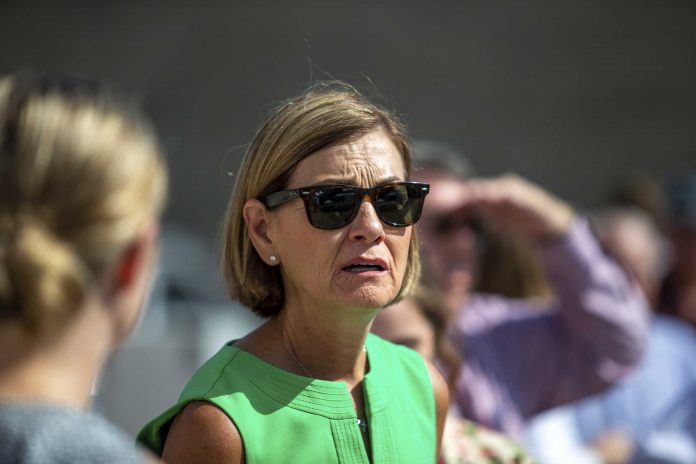
By RYAN J. FOLEY and DAVID PITT
Associated Press
IOWA CITY, Iowa (AP) — Agreements released Monday show Iowa is donating the use of state troopers and their equipment at “no cost to Texas” to fight crime along the U.S. border with Mexico, but a spokesman for Iowa Gov. Kim Reynolds said there still is a chance Texas could later reimburse some costs.
The agreements show Iowa troopers, members of an Iowa State Patrol tactical team that responds to high-risk situations, command staff and an investigator will be part of the deployment. The total number is redacted from the documents, but Iowa officials have said previously they expect to send 25 to 30 officers from the Iowa Department of Public Safety for a two-week mission this month.
Texas and Arizona asked other states to “absorb the associated costs with this mission” for the good of the country, according to the resource support agreements.
“Iowa is donating this resource,” according to the agreements, signed by the director of Iowa Homeland Security and Emergency Management on July 2 and released by the department Monday under the open records law.
Pat Garrett, a spokesman for Reynolds, said the agreements don’t necessarily mean that Texas won’t eventually pay Iowa for part of the costs, saying “nothing is final until we really end the mission.”
“Obviously, Texas and Arizona had an immediate need so we wanted to make sure we were answering it,” he said. “Again, we won’t have final payment details until all of this is over.”
Garrett said the state has ruled out the use of private donations.
Iowa Department of Public Safety spokeswoman Debbie McClung said Monday that discussions about “payment structures are ongoing.” The total cost of the mission is unknown.
Reynolds, a Republican, announced the deployment last month, responding to requests for assistance from the GOP governors of Texas and Arizona through the interstate Emergency Management Assistance Compact. She said that Iowa “has no choice but to act” to help secure the border, citing drugs, human trafficking and violent crime that affect all 50 states.
It’s believed to be the first time Iowa state police officers have been sent on an out-of-state mission since Iowa joined the compact in the 1990s. Several other Republican governors have pledged to send law enforcement in response to the requests, including those in Florida, Nebraska, Idaho and Ohio.
The interstate compact says states responding to disasters are to be reimbursed for their services and equipment by states receiving aid, but that states can establish separate agreements regarding costs.
Iowa’s agreements do not mention any potential cost recovery from Texas. The Texas emergency management official who signed them July 2 wrote in on each agreement, “no cost to Texas,” reiterating similar language in their text.
South Dakota Gov. Kristi Noem has said she would use a $1 million donation from a Republican donor to send National Guard troops. In a speech to a conservative audience Sunday, she criticized governors who sent officers to the border, saying it was irresponsible “to shortchange law enforcement.”
“They’re needed at home,” she said, adding that National Guard units were better trained for the mission.
Iowa also has 24 soldiers from the Iowa National Guard providing assistance to law enforcement at the border.
The documents released Monday show Texas has requested 434 state troopers, 75 investigators and six tactical teams from other states.
Iowa troopers will not bring their patrol cars and instead will team up with Texas state troopers and Texas Rangers, although one investigator planned to drive an unmarked car from Iowa, the agreements state.
All the officers will also need hotel rooms. They will, however, bring their own equipment including uniforms, handguns, rifles, ammunition, body armor and other gear.
The department redacted the start and end dates of their deployments, the number of state officers who will be assisting and other details of the missions, citing exemptions for confidential law enforcement information.
McClung has said the deployment — around 5% of the department’s sworn officers — would “not compromise the department’s ability to provide public safety services to Iowans.” She has compared the scope of the assignment to annual summertime deployments for officers to patrol the Iowa State Fair and a popular statewide bicycle ride.
But their deployment comes amid rising traffic fatalities on Iowa’s highways that the Iowa State Patrol said last month was caused by excessive speeding and other reckless driving.



















